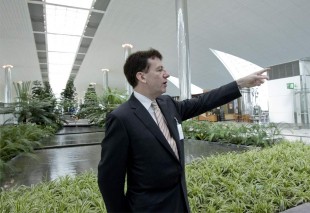

Dubai sees threat to $45bn aviation ambitions

Dubai's massive aviation growth plans, which would see $45.4bn in economic activity by 2020, are under threat from "yawning gaps" in airspace management, a senior official said on Monday.
Paul Griffiths, Dubai Airports CEO, said traffic capacity constraints posed a major obstacle to anticipated growth in the Middle East aviation industry and globally.
"By 2020, aviation will support 373,000 jobs – or 22 percent of the total employment in Dubai – and $45.4 billion in economic activity – or 32 percent of GDP," Griffiths said in a speech in Bangkok.
But he added: "When you compare the arrivals and departure banks using a typical peak arrival pattern last year with how it will look in 2020, the difference is dramatic. While the volumes are impressive, airspace capacity constraints are a threat. The airspace is not currently configured to support this growth."
Griffiths said that by 2020 aircraft movements in Dubai will surpass 560,000, passenger traffic will climb to 98.5 million from the 47.2 million recorded last year and cargo volumes will top 4.1 million tonnes up from 2.27 million tonnes in 2010.
He said air navigation service providers (ANSP) needed to change the way they operate and look at their roles in the global picture rather than see their services on a local level.
"There is needless concern over sovereignty issues which have been long overcome elsewhere with airspace seen more as a local product rather than a global commodity," he said.
"ANSPs have traditionally concentrated on the day to day business of operational delivery and very few have any depth of strategic planning capability to develop detailed plans for capacity and efficiency increases.
"This is holding back the pace of reform and investment. Airports and airlines are spending billions on expansion to accommodate growth and contribute to the local economy. ANSPs are lagging behind in bringing together the long term plans that will enable this investment to be fully realised," he added.
"We urgently need ANSPs to recognise that they are a vital component of an integrated supply chain and that all critical components are serving the same end customer."
He added: “There is a critical gap between politics and operations at both government and operating levels in presenting the compelling economic case for an efficient airspace environment.
“We simply cannot wait for the political wheels to grind so slowly. We have to recognise that working together is the only way forward.”
He said there was an opportunity for ANSPs to work together and become a global force in their own right in a bid to enable aviation's future growth.
Griffiths said in his speech that Dubai's next expansion project was Concourse 3 – the world’s first dedicated A380 facility, which will boost capacity from 60 to 75 million passengers per year.
"We are just putting the final touches on a masterplan that contains additional efficiency and expansion plans to increase capacity yet again," he added.
He also outlined the vision for Dubai World Central, the first phase of which opened almost a year ago.
By the mid 2020s, he said the majority of the airfield would have been developed with five runways and capacity for 118 aircraft movements per hour, 160 million passengers and 12 million tonnes per cargo.